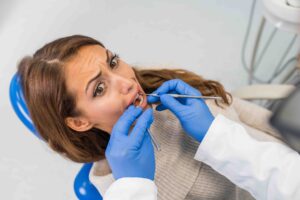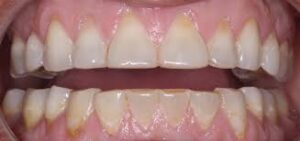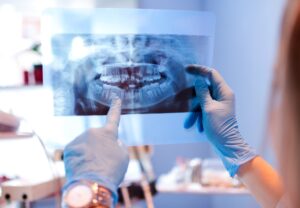
As a Macomb County dentist who is dedicated to optimal patient comfort, I feel dentistry sometimes gets a bad rap. In describing their perception of having dental care, some people, even today, use terms like “scared to death,” “worse than a root canal,” and even parents telling a child, “it won’t hurt much.”
As a child, I had many cavities and dental needs. I was blessed to have a caring dentist and parents who instilled that dentistry was a positive part of healthy; nothing to be frightened of. These experiences showed me such a positive part of the profession that I felt that’s where I wanted my career to head from as far back as my teen years.
I was lucky. Over my 25 years in dental practice, I have heard “horror stories” from people who have endured a rough, rushed or callous dentist who performed treatment where the individual felt trapped. Too, some patients explain their fears just emerged over time, perhaps triggered by certain sounds or sights.
Because I know that dentistry can be performed gently and without pain, these stories are hard to hear. They also make me even more determined to do everything possible to help transform a patient who is “scared to death” of dentistry into one that has a positive impression of their dental visits.
Dental fear or having intense anxiety associated with dental visits prevents some people from having regular dental care. It can also lead to delays in treatment, allowing small problems to require even more involved care.
For example, having regular exams and cleanings enable our dental hygienists to remove built up calculus from teeth, which is actually a hardened mass of accumulated oral bacteria. These colonies bore into tooth enamel and can lead to periodontal disease. Preventing these problems from occurring in the first place occurs with regular dental check-ups.
Dental caries, according to the most recent National Health & Nutrition Examination Survey found that 92% of adults ages 20 – 64 have had dental caries in their permanent teeth. This prevalence was shown to be higher in females (92.66%) compared to 90.57% of males.
Adults in this age group also showed an average of 3.28 decayed and/or missing permanent teeth and 13.65 average of decay of permanent teeth “surfaces” (which is decay in more than one area of a tooth) and/or missing teeth.
https://www.nidcr.nih.gov/research/data-statistics/dental-caries/adults
When a tooth develops a cavity, the decay must be removed and the area is “filled.” Although the filling material is designed to repair and restore, a tooth with more than one filling is a weaker structure with each filling. To avoid tooth fractures and, often, eventual breakage, we typically advise crowning a tooth.
This porcelain “cap” covers over the majority of the tooth to restore the durability and stability of the remaining natural tooth structure. Porcelain also provides the most natural look and feel available and has the best longevity of all restorative materials.
However, there are times when a tooth cannot be saved. Once removed, the advantages of the tooth’s roots are gone. This poses a problem in a couple of ways.
First, a missing tooth, not replaced soon after removal, allows adjacent teeth and the one above or below it to move out of their positions. When this occurs, a domino effect begins. As teeth tilt or turn out of position, the bite becomes misaligned. This can lead to chips, breaks or fractures in teeth. It can also trigger night-time clenching and grinding (known as bruxing).
When people clench or grind their teeth during sleep, the forces can be severe. This can be seen when the tops of teeth wear down and appear flattened, losing the slight curve that is a natural trait of each tooth. To accompany this, the jaw joints (TMJ) may become tender or start to pop. Ear ringing or vertigo may occur. Some people begin to have difficulty opening their mouths fully and experience frequent headaches or migraines.
Another problem of natural tooth loss is the absence of their roots in the jaw bone. The bone mass which supports natural teeth is actually maintained by the stimulation of tooth roots. Once removed, the bone begins to shrink, or resorb. As the jaw bone declines in mass, other teeth become more vulnerable to the problems of chipping, fractures or breaking.
The jaw joints, being strained from the rigors extended from a misaligned bite, can lead to a long list of problems that may range from those mentioned above to tingling in the fingers and sore neck and shoulder muscles.
One of the greatest benefits of dental implants is their ability to recreate the presence of tooth roots in the jaw. This restores stimulation to the bone and provides the same, sturdy foundation as that of natural teeth. Dental implants also give other teeth the neighboring support needed to maintain their positions.
But, back to fear. If you avoid dental visits because of fear, how do you get past this to receive the regular care you need?
We believe this occurs with small steps taken at a pace that feels right for each individual. We’ve addressed these in a simple “Guide” you can download from our web site: “Guide For The Fearful Dental Patient“.
Additionally, please know that we offer oral and I.V. sedation (“twilight sleep”). Both options are safely administered and the patient is overseen throughout their care with advanced safety monitoring equipment and trained team members.
Finally, our office is known far and wide for providing optimal comfort to our patients, at every visit. Care is administered in an uncrushed and gentle manner. Additionally, our advanced technology often minimizes treatment requirements as well as time in treatment.
As mentioned above, I have been an ear and a shoulder for hundreds of patients who, over the years, have shared their struggles in when it comes to dental care. Yet, I also know that people can get past this – when in the right hands – and come out on the other side with a healthy, confident smile.
Begin by arranging a no-charge consultation appointment in our Shelby Township dental office. Call 586-739-2155 or tap here. And I hope you’ll also get to know me at: Meet Dr. Barbat
and enjoy a brief video on why I chose the dental profession at: Dr. Barbat Shares